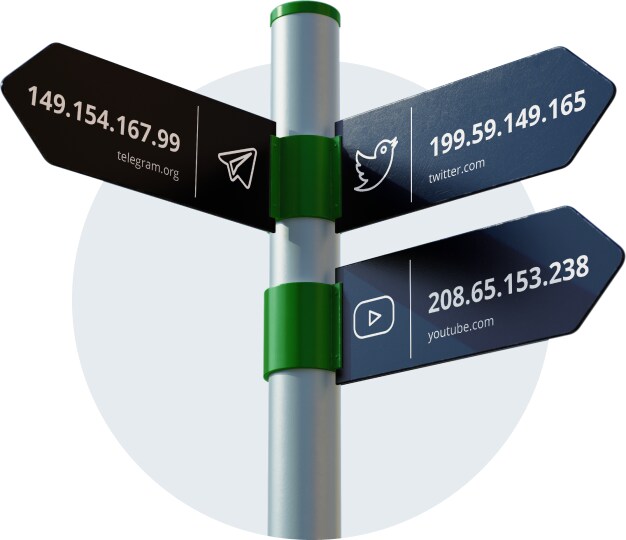Какой у меня IP адрес?
216.73.216.212
Ваша онлайн активность видна вашему интернет-провайдеру и всем, кто следит за вашими действиями в сети.
Работает в Chrome, Firefox, iOS и Android
Местоположение
Интернет-провайдер
Что такое IP адрес?

IP адрес (Internet Protocol address) это уникальный номер, который присваивается каждому устройству, подключённому к интернету. Можно представить его как ваш домашний адрес — он показывает другим устройствам, куда отправлять информацию, чтобы вы могли просматривать сайты, отправлять письма или смотреть видео.
Более технически, IP это набор правил, которые определяют, как адресуются и маршрутизируются пакеты данных в сети.
Как это работает: когда вы вводите название сайта, DNS сервер переводит его в IP адрес, чтобы ваше устройство могло найти и подключиться к сайту.
Вы можете узнать свой IP прямо на этой странице или введя в поисковик «какой у меня IP».
Более технически, IP это набор правил, которые определяют, как адресуются и маршрутизируются пакеты данных в сети.
Как это работает: когда вы вводите название сайта, DNS сервер переводит его в IP адрес, чтобы ваше устройство могло найти и подключиться к сайту.
Вы можете узнать свой IP прямо на этой странице или введя в поисковик «какой у меня IP».
Как изменить свой IP адрес
Чтобы скрыть своё устройство от определения IP адреса, потребуется VPN сервис. Он маскирует ваш настоящий IP, направляя трафик через VPN туннель. Так вы становитесь невидимым для провайдера и всех, кто пытается вас отслеживать.
Смена IP помогает защитить ваши данные. Кроме того, она даёт доступ к контенту с географическими ограничениями, как будто вы находитесь в той же стране, что и сервер, через который подключаетесь.
Смена IP помогает защитить ваши данные. Кроме того, она даёт доступ к контенту с географическими ограничениями, как будто вы находитесь в той же стране, что и сервер, через который подключаетесь.
Works in Chrome, Firefox,
iOS and Android
iOS and Android
Повысить безопасность
Гарантия возврата денег в течение 7 дней без риска
IPv4 и IPv6: в чём разница?
Существует две основные версии Протокола Интернета: IPv4 и IPv6. Обе версии используются одновременно, чтобы обеспечить плавный переход с IPv4 на IPv6.
IP адрес версии IPv4 в точечно-десятичной записи
IPv4
Введённый в 1981 году, IPv4 это оригинальная система IP, которая до сих пор широко используется большинством интернет провайдеров. Она использует 32-битный формат, что позволяет создать примерно 4,3 миллиарда уникальных адресов.
Адреса IPv4 состоят из четырёх чисел, разделённых точками, например 192.1.2.245.
С быстрым ростом количества устройств, подключённых к интернету, почти все IPv4 адреса уже заняты. Чтобы справиться с этим, сети часто используют NAT, Network Address Translation, позволяющий нескольким устройствам использовать один IP, что может усложнять соединения.
Адреса IPv4 состоят из четырёх чисел, разделённых точками, например 192.1.2.245.
С быстрым ростом количества устройств, подключённых к интернету, почти все IPv4 адреса уже заняты. Чтобы справиться с этим, сети часто используют NAT, Network Address Translation, позволяющий нескольким устройствам использовать один IP, что может усложнять соединения.
IPv6
Созданный в 1995 году для решения ограничений IPv4, IPv6 использует 128-битный формат, обеспечивая почти неограниченное количество уникальных адресов, около 340 ундециллионов.
Адреса IPv6 состоят из восьми групп шестнадцатеричных чисел, разделённых двоеточиями, например 2091:0da8:85a3:0000:0000:8a2d:0370:7754.
Последовательные группы нулей можно сокращать двойными двоеточиями, например 2091:0da8:85a3::8a2d:0370:7754. IPv6 включает встроенное шифрование и аутентификацию для более высокой безопасности и устраняет необходимость в NAT, упрощая сети и готовя их к будущему росту интернета.
Адреса IPv6 состоят из восьми групп шестнадцатеричных чисел, разделённых двоеточиями, например 2091:0da8:85a3:0000:0000:8a2d:0370:7754.
Последовательные группы нулей можно сокращать двойными двоеточиями, например 2091:0da8:85a3::8a2d:0370:7754. IPv6 включает встроенное шифрование и аутентификацию для более высокой безопасности и устраняет необходимость в NAT, упрощая сети и готовя их к будущему росту интернета.
Публичные и приватные IP адреса
Все IP адреса делятся на две категории: публичные и приватные.
Приватный IP
Публичный IP
Интернет
Публичный IP
Публичный IP адрес, также называемый глобальным или внешним, подключает вашу сеть напрямую к интернету. Например, ваш Wi-Fi роутер имеет публичный IP, как и сайты или серверы в интернете. Публичные IP видны в сети и могут использоваться для определения вашего приблизительного местоположения.
Приватный IP
Приватные IP адреса, также называемые локальными или внутренними, существуют только внутри вашей локальной сети. Такие устройства, как компьютер, телефон или планшет, получают уникальный приватный IP при подключении к роутеру. Эти адреса скрыты от интернета и могут использоваться повторно в разных приватных сетях.
Публичный IP адрес, также называемый глобальным или внешним, подключает вашу сеть напрямую к интернету. Например, ваш Wi-Fi роутер имеет публичный IP, как и сайты или серверы в интернете. Публичные IP видны в сети и могут использоваться для определения вашего приблизительного местоположения.
Приватный IP
Приватные IP адреса, также называемые локальными или внутренними, существуют только внутри вашей локальной сети. Такие устройства, как компьютер, телефон или планшет, получают уникальный приватный IP при подключении к роутеру. Эти адреса скрыты от интернета и могут использоваться повторно в разных приватных сетях.
Что может раскрыть ваш IP адрес?
Информацию, которую открывает ваш IP адрес, в основном используют маркетологи для таргетированной рекламы. Они создают цифровой профиль на основе вашей истории просмотров, местоположения, возраста и пола.
Где вы находитесь
Ваш IP адрес показывает страну, регион, город, почтовый индекс и интернет провайдера. С одной стороны, это помогает показывать более релевантные результаты поиска или загружать страницы на вашем родном языке. С другой стороны, это мощный инструмент в чужих руках.
Кто вы
Ваш интернет провайдер хранит информацию о вас: имя, домашний адрес, номер телефона и данные кредитной карты. Если киберпреступники узнают ваш IP адрес, это как дать им ключ от вашего дома.
Что вы просматриваете
Провайдер знает всё о вашей онлайн активности: какие сайты вы посещаете, что скачиваете и что ищете. Если вы посещаете сайты без HTTPS, провайдер может даже видеть конкретные страницы, которые вы открываете.
Зачем защищать свой IP адрес с Browsec VPN
Скрыть своё местоположение
У нас есть серверы в 46 странах, через которые проходит ваш трафик по защищённому VPN туннелю, скрывая где вы находитесь.
Защитить личность
Browsec шифрует ваши данные, делая невозможным доступ к личной информации и банковским операциям.
Скрыть историю просмотров
То, что вы делаете в интернете, касается только вас. Никто не должен знать, какие сайты вы посещаете, что скачиваете или ищете и покупаете.
Works in Chrome, Firefox,
iOS and Android
iOS and Android